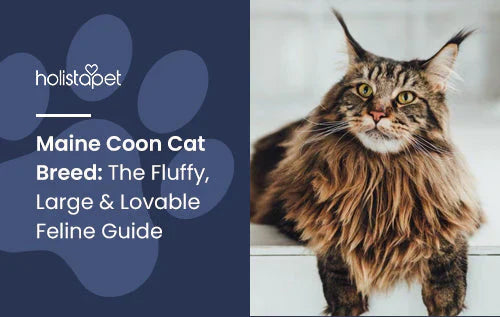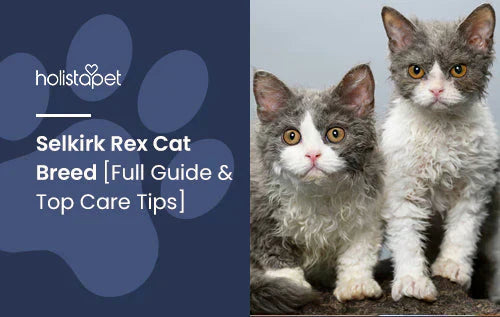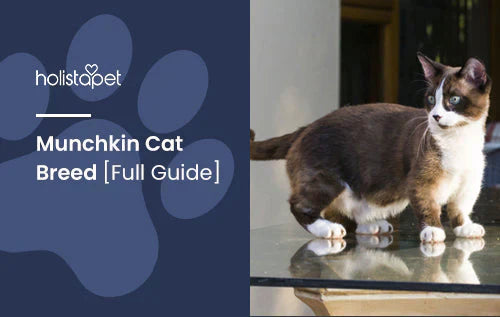The Maine Coon cat is one of the most well known cat breeds in the world. This is a cat breed with an extensive history and distinct breed standards that set it apart from other long-haired cats out there. These gentle giants are the official state cat of Maine, but they're loved throughout the world! Find out what makes these cats so special, from their larger than life appearance to their sweet and loving personality.

Maine Coon Cat Breed Origin & History
This big kitty is an American breed because it was first recognized in — you guessed it! — Maine. It's unclear how Maine Coon cats came to America, but there are many guesses (some more realistic than others).
- The Raccoon Theory: The Maine Coon cat is part raccoon. This was considered because Maine Coon cats have big, fluffy tails. They also like to dunk their food in water, which is a common trait among raccoons. Of course, that's not enough evidence to make this strange theory even remotely true. A raccoon-cat cross is biologically impossible!
- The Bobcat Theory: The Maine Coon cat was created by Bobcats mating with domestic cats. This hypothesis would explain the Maine Coon ear tufts, big paws, and immense size. But like the raccoon theory, this is probably not biologically possible, and nothing supports it so far.
- Queen Marie Theory: Some people believe that Maine Coon cats are the descendants of Queen Marie Antoinette's longhaired cats. It's said that these cats were smuggled into America by a captain, Clough, who had plans to rescue the Queen from the guillotine. But Marie Antoinette, as everyone knows, lost her head. Some historians suggest that the cats ended up staying with Clough in Maine.
- The Sea Voyage: Some speculate that a sea captain named Coon brought longhaired cats with him while exploring the United State's northeastern coast in the 1700s. These large cats helped take care of rodents on board. The long-haired cats aboard his ship bred with the local cat population onshore.
- The Truth (Probably): The final and most logical theory states that Maine Coon cats stayed ashore. Since they were such excellent rodent hunters, they were welcomed on farms. Maine is known to be cold, especially back in the days of no heaters. But the Maine Coon cat’s coat helped it adapt and survive. Natural selection led to large cats with plush coats.
While it's still not totally clear where the Main Coon cat came from, it's no secret that this big cat quickly became a popular companion. It was one of the first breeds recognized by the cat fancy in the late 19th century. Despite early interest, their popularity dwindled. But just like in the cold of the north, the Maine Coon cat survived and flourished. Today, the Maine Coon cat is one of the most popular cat breeds in the world!
Maine Coon Cat Breed Personality
The only thing larger than the Maine Coon cat is its personality! This is a loving cat known for its devotion to their family. While they may not be super cuddly, they love nothing more than being next to you. This feline will often follow you from room to room - they enjoy being a part of your daily routines and everywhere you are!
Despite their large size, the Maine Coon cat can be quite timid. Your cat will need time to adapt to your home and its daily routine. You will need to gain the cat's trust while they're adjusting to their new home. If you are patient and kind, the Maine Coon cat will form a deep bond with you, as well as the rest of the household. Once your Maine Coon cat gets to know you, you'll discover a lot of their quirky behaviors.
Since their coats are water-repellent and they've spent so much time out at sea, the Maine Coon cat is quite fond of playing with water. This usually entails putting their paw under running water from the sink or standing at the edge of the tub and watching you shower. This chatty kitty has a surprisingly soft and high-pitched meow for their size. This breed is also known to chirp, coo, and make other fun cat sounds. This is a cat that will definitely keep you entertained and well-informed.

Maine Coon Characteristics (Physical)
Through time, the Maine Coon cat has evolved into a hardy, tough breed. Their ruggedness is thanks to breeding in the harsh, northern climate, leading to an immense coat and fluffy tail. But a Maine Coon's looks aren't all about being big. As previously stated, Maine Coon cats have very distinct breed characteristics that define them as a unique breed.
Maine Coon Size
Legends say there are Mainecoon cats as big as 60 pounds! But breeding standards are a bit less than that, although still impressive. Female Maine Coon cats can reach 17 pounds, while males can be up to 27 pounds. Surprisingly, their length, on average, reaches 3.3 feet. In comparison, the average domestic cat is about 10 pounds with an average length of 18 inches.
The Maine Coon cat is muscular and broad-chested. While this feline typically tops lists of large cat breeds, it is considered well-balanced and without any exaggerations. They have a long, wide tail that tapers near the tip. The fur is long and flowing.
Head
The Maine Coon's head is wide with square features. Their muzzle is "visibly square" with a proportioned length, according to the Cat Fanciers' Association guidelines. They have a strong chin, described as "firm." The Maine Coon cat has large and expressive eyes that are oval-shaped.
Their high cheekbones accentuate these features, making the Maine Coon's face appear somewhat gruff. Their large, tufted ears further create the illusion of a grizzly and majestic creature. Maine Coon cats will often have green, gold, green-gold, or copper eyes. White and bicolor-coated variations of this breed will have blue or even “odd” eyes (two different eye colors).
Legs & Paws
Maine Coon cats have medium-length legs that are straight and wide-set. Their paws are large and round. You'll often see tufts between their toes. They have five toes in the front and four on their back paws.

Coat
The Maine Coon's coat is something else! They have a heavy, shaggy coat that includes three different lengths. The water-repellent coat is silky and smooth. You'll notice it's shorter on the shoulders and longer on their stomach and britches. They have a "frontal ruff" that makes them look regal and even larger.
This breed comes in any color and pattern except anything considered "hybridized," like chocolate or lavender. They also don't come in the Himalayan pattern or the Abyssinian's ticked tabby pattern. Tabby is the most common coat pattern you'll see on a Maine Coon cat, giving them a more wild, rustic appearance. Other common patterns include the classic tabby, ticked tabby, brown tabby, and red tabby. They can also be calico or tortoiseshell.
Maine Coon Cat Breed Care
Grooming Maine Coon cats should be as frequent as possible since they are big house cats. Luckily, the Maine Coon's coat isn't known to become matted. Instead, you want to make sure it's free of tangles and loose, dead fur. This will significantly cut down on hairballs and reduce their amount of shedding.
The Maine cat will also need other regular care practices. This includes daily tooth brushing to avoid dental issues. If you can't find the time every day, weekly brushing and dental treats will suffice. You should also check their ears for wax and dirt buildup. You can also trim their nails every week if the length gets too long or you notice them scratching at furniture.
The Maine Coon cat should be kept strictly indoors. While they are large, they can still be hit by cars, attacked by dogs, eaten by wild animals, or scratched by feral cats. This can lead to infection or even deadly diseases like FIV, which compromises their immune system. Maine Coon cats may also catch the eye of cat nappers looking to snag a large and interesting cat.

Health Problems
Like most purebred cats, the Maine Coon cat has some hereditary conditions to look out for. Always adopt from a reputable breeder who offers health guarantees on their kittens. They will often screen for these diseases to ensure they are not continued in their bloodline.
Hypertrophic Cardiomyopathy
Hypertrophic cardiomyopathy is the most commonly diagnosed cardiac disease for all cats, not just Maine Coons. But, this genetic disease is most common in Maine Coons, Ragdolls, British Shorthairs, Persians, Sphynx, and Chartreux cats. This occurs is when the muscular walls of a cat's heart start to thicken. This makes the heart work less efficiently.
A cat with HCM has a thickened left ventricle, which leads to abnormal relaxation of the heart muscle. The thickening results in increased oxygen usage and even "oxygen starvation." This makes some of the heart's cells die off, making the heartbeat too rapidly, too slowly, or in an irregular rhythm.
Fortunately, proper diagnosis and treatment can decrease the chance of a cat with HCM experiencing these symptoms. While cats are good at hiding illness, you will notice labored breathing, open-mouthed breathing, or your cat being more lethargic. Blood clots can also lead to limb pain or even partial paralysis. Be on the lookout for these worrisome symptoms and bring your cat to the vet immediately if you notice something off. A good treatment plan can ward off the more serious side effects.
Hip Dysplasia
Hip dysplasia is considered rare in felines but can happen more often to the Mainecoon cat population. It's an orthopedic disorder caused by the malformation of the ball-and-socket joint that connects your cat's thigh bone to their hip. Cats typically have great flexibility, but hip dysplasia prevents them from moving smoothly, the parts of their leg bone painfully grinding against each other.
Over time, the wear and tear will result in the femoral head to become worn, flattened, and misshapen. The entire joint can even become loose. The cartilage may also slowly be destroyed. If your cat is achy, try providing them with CBD oil or CBD cat treats. CBD interacts with the cannabinoid receptors in your cat's endocannabinoid system (ECS), boosting the system's function.
Related: What Can I Give My Cat For Pain Relief?
Nutrition
Maine Coons are large, but they shouldn't be obese. Make sure they are not overeating by implementing a timed feeder. This will provide your cat with the proper amount of food each day, split up throughout various meals. Make sure to also look for cat food with quality ingredients. Avoid brands where the first ingredient is something like "chicken meal." You should also avoid food brands with an excessive amount of carbohydrates, like corn and wheat.

Children & Other Pets
Even though this feline is quite large, the Maine Coon cat is known as the "Gentle Giant." These cats are often used as therapy cats because of their calm and sweet dispositions. Their loving personalities make them the perfect companion for younger kids. Children will love having this big lug to lounge around with and will never get bored of making them chase ribbons and balls.
Maine Coons often get along great with other cats — and even dogs. With a proper introduction, Maine Coons will enjoy their companionship. Always supervise your dog's interaction with your cats, just to make sure they don't start playing too rough. These cats may be big, but they certainly aren't very aggressive!
More About the Main Coon Breed
The Maine Coon cat may have had a difficult period in the 1950s, but the breed is more popular than ever. They are the second most popular cat breed in the United States, only losing out to Persians. They are also the official state cat of Maine! The Maine Coon cat may be American, but it's also beloved in Japan and Europe thanks to its size and temperament.
They are so loved, in fact, that someone even tried to clone one! A Maine Coon cat named Little Nicky died in 2004 at the age of 17. His owners paid $50,000 to have their favorite pet cloned in California. A surrogate mother cat carried the embryo, giving birth to a cat with Little Nicky's disposition and appearance.
It's no surprise that this feline continues to catch people's eyes. They're huge! A Maine Coon named Stewie held the Guinness World Record for world's longest domestic cat before his death from cancer in 2013. Fully stretched out, Stewie was almost 49 inches from the tip of his nose to the end of his tail bone.
Other popular Maine Coons include Pebbles, who played Mrs. Norris in the Harry Potter movies. Pebbles was reportedly great at walking across the set and then stopping on command. This allowed them to get great shots of Mrs. Norris pacing Hogwart's halls throughout the film.
Maine Coons will often set you back $900 to $2,000 — they are one of the most expensive cat breeds in the world! However, for many people, it's totally worth it. This is a cat that has a presence like no other. It's large and majestic, with a wise face and imposing size. But it also is sweet and loving. This is a cat you will always want to have around you.

Final Thoughts
The Maine Coon cat is a truly remarkable cat breed, blending majestic physical traits with a gentle and loving personality. Their unique history, impressive size, and affectionate nature make them beloved companions worldwide. Whether you're drawn to their playful quirks, luxurious coat, or "gentle giant" demeanor, the Maine Coon is a breed that stands out in every way.


 CBD Oil for Cats - Fast Acting
CBD Oil for Cats - Fast Acting
 CBD Cat Treats - Easy Dose
CBD Cat Treats - Easy Dose
 CBD Calming Chews for Cats - Highly Rated
CBD Calming Chews for Cats - Highly Rated
 CBG Oil for Dogs and Cats - Loved by Thousands
CBG Oil for Dogs and Cats - Loved by Thousands





Leave a comment
All comments are moderated before being published.
This site is protected by hCaptcha and the hCaptcha Privacy Policy and Terms of Service apply.